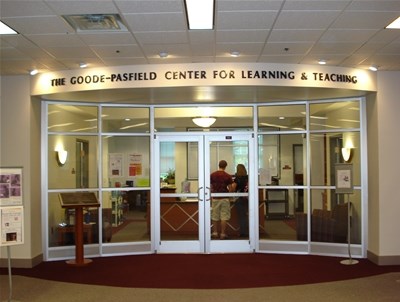Written by Bradley Bommarito
As students face increasing workloads over the course of a semester, they may become aware of academic areas or skill sets that they need improvement in. Whether one is struggling in a particular discipline or overcoming deficiencies in their writing skills, students who choose to seek support through RC’s Subject Tutoring or Writing Center will find that help is never far away.
“A variety of on-campus academic resources are available to students, including faculty members’ office hours or research assistance from the library staff. In addition, the CLT offers Academic Coaching, Subject, and The Writing Center. All of these services within the CLT are free to all Roanoke College students,” said Elizabeth Myers, coordinator of Subject Tutoring and the Testing Center at RC’s Center for Learning and Teaching (CLT).
These resources are designed to provide more individualized support that goes beyond what one experiences in the classroom. A variety of tutoring strategies and composition pedagogies are utilized to reinforce and build on the content present in coursework.
“We all have different ways of learning, and sometimes it can be really helpful to address material in an additional format beyond classroom lecture or reading text. Discussion or hearing a concept rephrased in a different way can be a useful learning tool that can make the difference in mastering course material,” said Myers. “Also, the very act of taking the initiative to become more engaged in one’s studies can increase momentum in finding motivation and success.
Open from 4 p.m. to 9 p.m. Sunday through Thursdays evenings, both services offer appointments of varying lengths with peer tutors. Students can come in to work on specific assignments and skill sets, or they can receive more general assistance.
“When scheduling or preparing for an appointment, it’s ideal when students can state what specific concepts they’d like to work on in the session. However, tutors are trained to ask intentional questions to identify where a student needs help,” said Myers.
Misconceptions about tutoring may intimidate students who would otherwise take advantage of the extra help, especially students who may have never asked for academic assistance before.
“Sometimes students seem to think that tutoring is only for those who have not been successful in academics, but that often isn’t the case. In fact, coming to Subject Tutoring shows a dedication to learning, as well as the wisdom to take advantage of available resources. Working with a tutor is actually an indicator of academic success. Additionally, students sometimes assume there is a cost for tutoring, and it’s free,” said Myers.
One of the most prominent misconceptions is that tutoring is for students who are not performing well. Students may not realize that tutoring has something to offer for students of all levels of academic achievement.
“We would like for students to think of us not as emergency medicine but as preventative care. Visiting the Writing Center is like eating well and exercising and getting regular check-ups, it’s good for everyone who writes,” said Sandee McGlaun, associate professor of English and director of the Writing Center. “You don’t need to wait until you’re ‘sick’ or struggling to visit us. Come early and come often!”
Students may be surprised to learn that the Writing Center helps with more than just papers.
“I think many students may not be aware that we offer help with oral presentations,” said McGlaun.
More information about Subject Tutoring and the Writing Center can be found on their respective webpages through the library’s website. Students interested in applying to be peer tutors can locate applications online.




